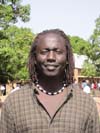
“A lack of education for women is a disaster in the making for southern Sudan.”
Jok Madut Jok, born and raised in a village of 200 people in southern Sudan’s Warrab state, spoke powerfully about the importance of educating women in southern Sudan, a region still devastated by over two decades of civil war. This war between the Sudanese government in northern Sudan and a southern rebel group known as the SPLA, ended in 2005 with the signing of the Comprehensive Peace Agreement, or CPA. Today, both parties have not succeeded in implementing significant provisions of the complex agreement, which is becoming increasingly fragile as the country lurches toward national elections. The elections are to be held in 10 months as the last benchmark in the CPA before the 2011 referendum on whether or not southern Sudan will secede from the North and gain independence as a new state.
Speaking yesterday at the Rift Valley Institute course on Sudan in Rumbek, southern Sudan, Professor Jok was less concerned about the political status of southern Sudan and more focused on how the South’s people, extremely diverse ethnically yet somewhat united by shared experiences during the North-South conflict, must promote the role of women as they work to rebuild their war-torn society in the years ahead.
“Across the board, and before, during, and after the war, the majority of physical labor and work in our society has fallen on the women, and they have received little praise or honor for this,” Jok stressed. He stressed some of the intense and rapid changes occurring today throughout southern Sudan, from the effects of displacement to countries such as Ethiopia and Egypt during the war and the experience of returning home today, to the impact of urbanization on traditional practices such as cattle raising in his own village and other areas of southern Sudan where cattle-centered ways of life were the norm for centuries.
Jok explained that today, women must occupy a central place in these societal processes, and that southern Sudan will not succeed if its people and its leaders do not invest in women as future leaders. “It is a challenge to get communities to see women’s education as a benefit, but it is the only way forward for southern Sudan.”
Indeed, empowering women not only in southern Sudan, but in other countries gripped by conflict or slowly recovering from its effects, is one important way to ensure that these countries will have a “fresh start,” because an equitable and just society cannot be built or rebuilt without consideration of all of its citizens. The majority of the women of southern Sudan have waited long enough for their opportunity for political participation, educational and economic opportunities, and undoubtedly, for the respect they deserve as the backbone of their society. Now is the time for the men of this region—brothers, husbands, and sons—to work with their fellow citizens, female and male, and prioritize women’s empowerment and gender equality in order to strengthen and build their communities at the local and national level.
This is part of a series of posts on southern Sudan by Enough policy assistant Maggie Fick, who is currently conducting research for Enough in the region.
Photo: Professor Jok Maduk Jok. Enough/Maggie Fick

